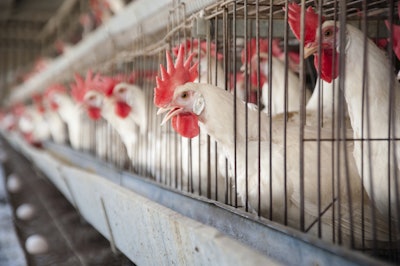
Egg drop syndrome (EDS) has been detected on over 20 farms in northern Indiana.
EDS causes a significant decrease in egg production, as well as eggshells to be extremely thin or nonexistent. The virus solely affects brown hens, with the most common indication of the virus being a lack of eggshell pigment.
EDS outbreaks can potentially last up to 10 weeks and reduce egg production by up to 40%, according to Alejandro Banda DVM, Mississippi State University Clinical Professor.
“Thin‐shelled, soft‐shelled or shell‐less eggs will occur. It seems that this problem does not affect fertility, but hatchability may be reduced,” he stated. “The EDS virus is likely transmitted from asymptomatic ducks to poultry through drinking water contaminated by droppings. Ducks and geese are the natural hosts of EDS.”
While EDS can move vertically and horizontally, it is exclusive to the avian species and has no public health risk if eggs are cooked properly before consumption. However, the virus degrades the eggs’ value, making them unmarketable to customers.
“Chicks infected in ovo usually do not excrete the virus or develop antibodies. The virus remains latent until the hens reach 50% or more of their egg production,” explained Banda.
Prevention measures
Because a vaccine has not been developed yet, it is vitally important for producers to increase biosecurity measures and revaluate protocols concerning cleaning and disinfection.
“Special attention should be paid to materials used to transport or pack eggs,” said Banda. “Egg trays should not be shared between farms or reused. Extreme hygiene measures should be taken in hatcheries to separate contaminated eggs batches from clean eggs.”
Indiana
The Indiana State Board of Animal Health (BOAH) is encouraging producers to report signs of the disease immediately and has adopted an emergency rule on reportable diseases in birds.
Denise Derrer Spears, Indiana State BOAH Public Information Director explained that the rule puts the virus on a list of reportable diseases. If a veterinarian or laboratory finds a positive test or a clinical sign of EDS, they will notify the Indiana State BOAH for tracking purposes.
“Because this is so new and it is a small number of farms that we know of, we are trying to monitor the situation and make sure it is not spread more widely and we are really working with those farms to stamp it out if we can. That was the reason for getting egg drop syndrome virus on the reportable list, to make sure that any cases that do crop up make their way to us,” stated Spears.


















